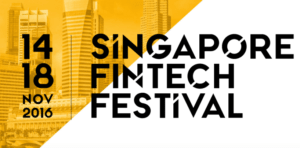2016 was an important year for Singapore as the city-state moves further to become a leader in fintech. Ranked as the second leading fintech hub in the world by Deloitte, Singapore has made financial technology one of its top priorities.
The local fintech scene has largely benefited from the strong governmental support, which has encouraged fintech ventures to settle in and influenced some of the world’s largest tech firms and banks to open innovation labs.
Key announcements have been made throughout the year, which have further reaffirmed Singapore’s commitment to the field. Here are our highlights of this year’s key fintech moves in Singapore.
The world’s largest fintech event
 In November, Singapore hosted the much-anticipated Fintech Festival 2016, a week-long event aimed at “celebrating” fintech. The event, which brought together some 11,000 participants from over 50 countries, gathered top fintech experts, thought-leaders, senior executives from the world’s largest tech firms and banks, policy makers and investors, to discuss the future of banking and finance.
In November, Singapore hosted the much-anticipated Fintech Festival 2016, a week-long event aimed at “celebrating” fintech. The event, which brought together some 11,000 participants from over 50 countries, gathered top fintech experts, thought-leaders, senior executives from the world’s largest tech firms and banks, policy makers and investors, to discuss the future of banking and finance.
The inaugural Singapore Fintech Festival 2016 was the opportunity for many to share about their latest initiatives and projects. Among which, the launch of DBS Bank’s innovation space DBS Asia X, a 16,000 square feet innovation space dedicated to “designing iconic customer experiences” and fostering greater collaboration with the fintech startup community.
Strengthening fintech ties with key partners

Handshake via Pixabay
This year, Singapore has signed agreements with other nations to boost fintech ties.
Notably, the Monetary Authority of Singapore (MAS) and the UK’s Financial Conduct Authority (FCA) inked a partnership in May to set up a fintech bridge helping UK fintech firms and investors access the Asian market and expand to Singapore, and attracting Singapore fintech companies and investors to the UK.
The agreement enables the regulators to refer fintech firms to their counterparts across the globe, and allows them to to share and use information on financial services innovation in their respective markets.
In June, MAS and the Australian Securities and Investments Commission (ASIC) signed a similar agreement, which was followed the announcement in August of an enhanced Singapore-US strategic partnership, and another fintech collaboration this time between MAS and the Korean Financial Services Commission (KFSC) in October.
New fintech funding schemes
During the Singapore Fintech Festival 2016, Deputy Prime Minister Tharman Shanmugaratnam announced a funding scheme to support anyone with a solid fintech idea they want to test while based in Singapore.
Under the new grant scheme, MAS will fund up to half of the cost of promising fintech proof-of-concept trials, or a maximum of S$200,000 for each project.
The scheme adds to other support schemes available to fintech players, such as Spring Singapore’s grants for Singapore start-ups matching S$7 for every S$3 raised, up to S$50,000.
MAS has its own funding scheme, the Financial Sector Technology and Innovation (FSTI), which is committing S$225 million over a period of five years to boost fintech development.
Regulating fintech
Following the steps of the UK, MAS announced plans for a regulatory sandbox for fintech experiment back in June.
The initiative aims at enabling financial institutions as well as fintech players to experiment with innovative financial products or services in the production environment but within a well-defined space and duration. The sandbox will also include appropriate safeguards to contain the consequences of failure and maintain the overall safety and soundness of the financial system.
In November, MAS published guidelines to enter the regulatory sandbox. These were released after a month-long public consultation that closed in July.
On the regulatory level still, MAS has committed to “provide regulation conducive to innovation while fostering safety and security.” Under this principle, the authority has already deployed a few concrete initiatives:
- A new working group dedicated to creating a single, activity-based modular framework for payments companies.
- Specific guidelines to promote secure cloud computing.
- Enabling digital financial advice and insurance.
- Strengthening cyber security.
Furthermore, MAS plans to “significantly simplify and shorten the authorization process for new VC managers,” the Deputy Prime Minister said in November.
“Further, to the extent that there are contractual safeguards to provide sufficient protection to a VC’s sophisticated investor base, MAS is also looking to exempt VC managers from business conduct requirements that are currently applied to asset managers in general,” he added.
MAS aims to roll out the rule amendments by July of next year.
Singapore introduced new measures earlier this year to simplify the use of securities crowdfunding for companies that are looking to raise funds, as well as for crowdfunding platform operators. The new licensing regime comes at the end of a public consultation process that took over a year.
For platform operators, MAS has simplified the pre-qualifications needed for those raising less than S$5 million within 12 months, allowing them to do so without having to issue a prospectus. The changes also simplified checks needed for investors so that the process can be quicker and easier to execute.
Financial requirements for platform operators who raise funds only from institutional and accredited investors, were reduced, making it easier for them to be licensed as dealing intermediaries.
Blockchains everywhere
MAS is working alongside the city-state’s stock exchange and eight banks on a proof-of-concept project aimed at simplifying the payments process and reducing transaction costs.
It seeks to develop and test MAS’s very own digital currency which the authority will use in a trial of a blockchain-driven system for interbank payments.
It may include cross-border transactions with the participation of another central bank in the future, Ravi Menon, MAS’s managing director, said in November.
“Today, banks have to go through correspondent banks to intermediate these payments. It takes time and adds to cost,” he said in a speech. “This project marks the first step in MAS’s exploration of ways to harness the potential of central bank-issued digital currency.”
Featured image credit: Unsplash








